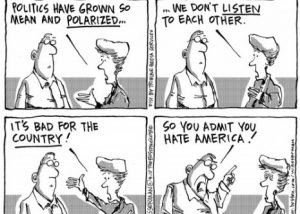
Along with voting, engaging in fact-based, collaborative political dialog is essential to improving political leadership. If our leaders are always angry, ignoring the facts, and putting petty political squabbles ahead of true progress, it’s because that’s what we do and what we respond to. Since a lot of people don’t vote, and people who are angry are more likely to swing the vote than people who believe in an effective bureaucracy, that’s what our elected leaders are appealing to.
So, as much as you are capable of, engage calmly. Do not try simply to change everyone to your point of view, but try to keep them calm, listen to others’ point of view, and help to inform. Most people won’t change their minds, and don’t want you try try to change their minds, but they are happy to talk and we have only to gain by lowering the anger level and raising the awareness level.
I serve in part of a program called “DC Ambassadors” where we reach out to voters outside of the District of Columbia to try to raise awareness of the status of voting rights for DC (or lack thereof). I have yet to find anyone who is angry about DC voting rights outside of DC, and I certainly don’t try to make anyone angry. Most people are happy to become better informed.
Remember that we can expect that the election process will continue to try to make voters angry, because that is what they think will get them to the polls. But we don’t want them to vote angry, because that’s what makes it so that we’re manipulated into bad policy.
